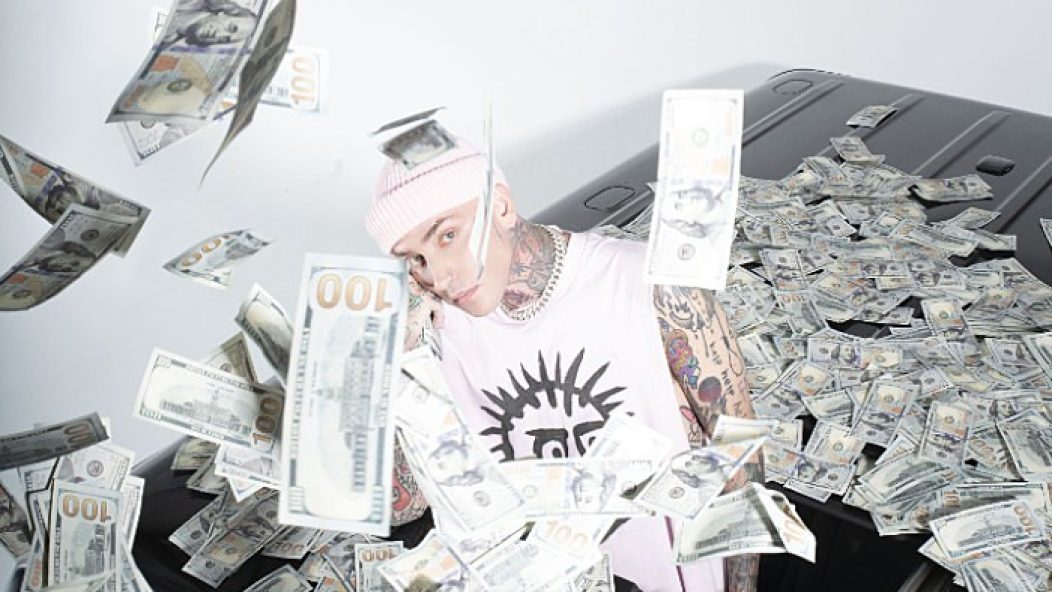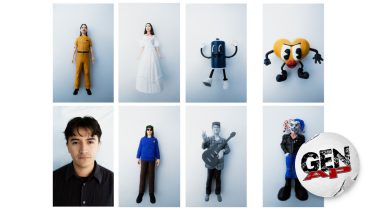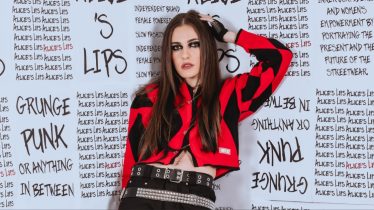
blackbear on the path that led from his emo roots to a new sonic lane
Born and raised in Florida, Matthew Tyler Musto—these days better known as blackbear—has been making music, and making music his life, since at least 2006.
With five studio albums and seven EPs under his belt (or should that be pelt?), releasing his latest extended play, misery lake, Aug. 13, this year finds blackbear riding high and duly on course to reach a whole new audience and, accordingly, likely a whole new level of fame. Poised to tour North America with Maroon 5 this year as their main support, those upper echelons, now well within blackbear’s grasp, are a marker of just how far he’s come, personally and professionally.
Read more: blackbear releases “@ my worst” along with cinematic visual —watch
From releasing his debut album through his own record label, Beartrap, to signing a deal with Interscope that allowed for a retention of creative control with a whole new world of possibilities—an arrangement not too dissimilar to the one which turned small-time startup Fueled By Ramen into a household name—bear’s career trajectory reflects a unique mix of clout, commitment and, most importantly, raw talent.
And it’s in service of the latter where we find blackbear working so doggedly when it comes to misery lake.
As a body of work, it has all the hallmarks of a bear record—a fusion of sounds that nod to everything from late-’90s and early ’00s emo to trap to soul and R&B—but, most starkly, and more so than ever before, it has been created with nowhere to hide. Musto’s voice is on full display, brightening the dark corners of misery lake’s sonic and lyrical universe with its unique tone and timbre. Not so much a counterpoint to the EP’s sharper edges, not working against them, but instead working in collaboration to smooth them out—but never so much as to dull their potency.
Read more: Trash Boat takes us behind the scenes of ‘Don’t You Feel Amazing?’
On misery lake, blackbear’s past, present and future collide and align themselves as one. The dividing lines between his different stylistic influences—contemporary pop, electronic, hip-hop, trap, pop punk, soul and even hardcore—blur, bleeding into one another. Rather than chaotic, though, the result is considered and precisely executed—a carefully curated showcase of his talents as a singer, a songwriter and a musician. And, perhaps most impressively, a testament to a true love for music at large, without caveat, and the art form’s capacity to convey and channel emotion, with no regard for genre.
For bear, it has been a long road, traveled often at pace and sometimes wearily. The pressures that come with fame—the incessant noise of social media, the lack of privacy, the weight of expectation—have compounded, at times, into personal crises. Now, having moved if not past these then at least through them, we are given our first glimpse at not so much of a new blackbear as a renewed blackbear—an artist with an optimistic outlook on life, still willing to acknowledge the darker elements but always, above all else, either looking for the light in the room or creating that luminescence for himself and those around him.
I saw something on Twitter recently where you posted a photo of your young self and mentioned you’ve been emo since the early days—what were you listening to back then, and what got you into the bands you liked? How did you find that music?
i had a babysitter when i was in the 4th grade named danny finerman who played in a local emo band in palm coast, fl and gave me my first new found glory album, the self-titled album. i started learning nfg and blink riffs on guitar like “dammit” and was inspired by the lyrics to songs like “dressed to kill” and “better off dead.” from there, i got into more emo: saves the day, the movielife, the used, the postal service and death cab for cutie, brand new, midtown, bayside, sum 41.
alkaline trio was my all time favorite tho. i tattooed their logo. then i got into ska pretty heavy like catch 22, less than jake, mustard plug and rx bandits. then i got into a darker hardcore screamo phase where i graduated to the devil wears prada, stick to your guns, hatebreed, as i lay dying, underoath, saosin.
then there was a moment where all i listened to was acceptance and terminal. even went thru a punk phase where all i listened to was anti-flag, the casualties and leftover crack. i had a short mindless self indulgence phase as well. the list goes on forever. i’d like to think that all these bands influenced my writing. then when i was 19, i moved to atlanta to study under ne-yo where i really got into r&b and, boom, blackbear.
How does this early emo/punk/hardcore music influence the music you continue to make?
the vulnerability, the realness. the melodies and the lyrics shaped my original high school band that was once in AP magazine, polaroid. we got signed by an indie label out of buffalo, ny called leakmob records and started to tour in a jeep wrangler with a wooden trailer in 10th grade.
You work between R&B, electronic, pop and alternative music—how do these genres connect for you, personally?
i just love good music at this point. if u can sit down and sing an edm or r&b song on acoustic or piano, u know it’s good.
Do you think there’s really any distinction left between those different kinds of music? It feels like their subcultures, their tribes, whatever you want to call it, are all blurring into one these days.
u said it the best. i feel like i could go on tour with maroon 5 or all time low and still have the same crowd show up for me, which is awesome. that’s love.
People have sometimes pegged you as another nihilistic, downbeat artist, but it feels like you’re working against that type these days. Is it because you want to prove them wrong, or is it just because things have changed for you and you feel differently?
look, i’m happy now, but i struggle with crippling anxiety and depression. over the years, i’ve battled 10+ surgeries for chronic pancreatitis and a heavy cocaine addiction. now that i’m five years no alcohol and almost three no hard drugs, i’m just focused on making music that makes me feel happier and sometimes that involves self-pity, but i was taught to be as vulnerable as possible and stay true to who i am. and ever since i had my son and got engaged, i have a reason to wake up every day, so my music reflects that, but also reflects the trials i’ve faced.
It seems like, professionally, it’s been a long road—or, at least, you’ve covered a lot of ground in a short space of time to get from where you were to where you are now. Everything changed for you, really, since 2016, and it’s clear from your music just how much. What professional influences specifically during these last five years have played a role in that?
from learning songwriting from people like ne-yo and mike posner, i’ve learned to write from the heart and always add ur own personal flair to everything u do. i’ve consistently not given a fuck about what people think of me because there’s no point to stress about what u can’t control. no point in stressing about what u can control, either. no point in stressing. i just keep showing up for myself, my career, my fans and my family, and things seem to work themselves out.
What personal influences have changed in the last five years?
i quit drinking five years ago, and that really taught me to be myself and my body and help others when i can. when i’m not sick and in pain in bed from pancreatitis, i’m making songs or in the gym or playing with my son, midnight. five years ago, it was much different, and i didn’t have a lot of respect for myself and would act out a lot. i was a millionaire by the time i was 21 because i signed to universal as a writer and wrote “boyfriend” for justin bieber. i blew all that money within a year and had to build blackbear with the intention of it paying my bills one day too. luckily, it worked out after i made “idfc” in my bedroom with a shure sm7 mic, a macbook and a midi controller. no writers or producers.
misery lake paints a fairly bleak picture with its name and its tracklist. But would it also be fair to say that isn’t the whole picture?
it really is just about the place i was in 2020. sometimes i was happy and sassy and sometimes i was proud, and sometimes i just couldn’t get out of bed for days. “alone in a room full of people” is the first song for a reason!
On your last album, everything means nothing, you mixed darker subject matter and contrasted with beats and melodies that feel inherently uplifting. Can we expect that same counterbalance on misery lake?
some but not much. misery lake is everything means nothing’s evil stepchild altho there is a happy beat to “bad day,” and the lyrics are definitely not happy.
misery lake feels almost like club jams, but then also music geared toward evenings on a Balearic island beach and then to tracks that remind me of Juice WRLD to others that sound almost like they could have come from a Dashboard album. But through all of that, it never feels disconnected. What are the parallels you draw from misery lake, and are connections or references to other bands or sounds ever intentional for you?
i take this as a major fucking compliment, so thank u. i would say i was inspired by all the bands i’ve mentioned but also inspired by my wicked mental state. i felt like i was in the movie girl, interrupted, and i was playing angelina jolie’s character haha.
misery lake is billed as an EP, but, in a way, it feels like a mixtape—in both senses of the word. Firstly, in the sense that you’ve kind of collected all of your favorite sounds together. Secondly, in that it really feels like you’re just showing the world what you can do here in terms of songwriting, production and vocal work. If this is a proper showcase of how you’re feeling in this moment right now, do you have an idea of what fans can expect in the future?
good question. i don’t really know. i just know i want to use more real instruments than i already am in the production and maybe dig deeper into my life story cause it’s been fucking crazy, and i’m lucky to be alive today. life is war.
You can read the full interview in issue 397, available here.









